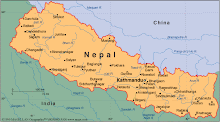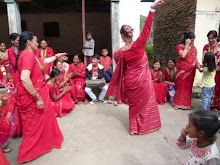
My friend John wrote to me almost a year ago inviting me to his wedding. He had met a woman in London who he had fallen in love with, and he had proposed to her a few weeks earlier. I was sort of surprised by his email, because I hadn't heard yet about this woman, but also not so surprised. John had wanted to get married for a good long while. I knew it was just a matter of time before he found someone to take that journey with him.
His email to me was short. They always are. He said something to the effect of: I'm getting married. You're invited to the wedding. It's in October here in London. Oh -and Monica is from Ghana. Her family follows the dowry system!!!
Sure enough, John and Monica got married. I wasn't able to make it, because I had just taken a trip to Europe for another friend's wedding in Italy and I'll be paying off my VISA bill forever for that.
John came back to Portland for Christmas this year , however, to visit his family and to show Monica his hometown. They had a reception here for all the people who weren't able to make the wedding so they wouldn't feel like they had totally missed out.
Monica is beautiful, smart, well spoken, and warm hearted. And Christian. She and John are perfect together. There was food at the reception, family, friends, presents...all that good stuff.
I really wanted to know just one thing, however. Could John please tell me about the dowry? How did that all look and go down - for real? I'm really can't ever shake the anthropologist in me. It's always there - albeit sometimes hidden. Not right now, though. This was fascinating to me.
Don't worry, he said. He would be showing a videotape shortly of his 3 weddings. The first was the Ghanian ring ceremony and the giving of the dowry. This - in the eyes of Monica and her family - was the wedding. The second was a state wedding, which was necessary since John is a foreigner in London. The third was a church wedding. At the church were Monica leads Sunday school (if I heard and remember right). All three were beautiful in different ways.
Of course, the first Ghanian ceremony was the most interesting to me. I've never seen anything like it. Apparently Monica couldn't accept the engagement ring until at this ceremony. The ceremony is a chance for two families to ask questions, to grill each other, to compete, and to ultimately (if all goes well) to bless a couple's marriage.
Traditionally, Monica explained, the purpose of this family banter, competition and unification was a tactic in bringing together warring tribes. A marriage could potentially bring about peace between two groups.
Each potential bride and groom bring their own spokesperson. This person leads the show. They barter back and forth about the size of the dowry, they suggest how their family might be better than the other, and they ultimately decide if the marriage is a "go" or not.
As part of his dowry, John had to bring around $4000 for Monica's brother, and about 40-50 gifts for Monica. Everything she might need in her new house: kitchen gear, bedsheets, jewelry and a *whole* bunch more.
Becuase this ceremony is more about family support, fun, and maintaining tradition at this point, John and Monica knew from the beginning that their marriage would be blessed.
Nevertheless, there was a four-hour long process of gift giving, negotiating, singing, challenging and rivaling, theatre, and finally, a tearful gifting of the wedding ring: from John's mother to Monica - her new daughter.
You might think like I did that the dowry system is very much about men and power (i.e. women as property). And you might also be surprised that the men didn't really have anything to do with this whole ceremony. Well, that's not true at all. Their job was to sit in the house, to socialize, and to tell the women whether they gave their consent or not. But they weren't a part of the goings on otherwise.
It was the women who were yelling, singing and bantering. They were wanting to know, really: did John *really* love Moncia? Was he *really* going to take good care of her? What he *really* worth marrying?
I wish I could show you the look on John's face as he watched these loud, rowdy, beautiful women decide his future. It was clear that there was nothing he could do or say now that he was here. His dowry and the spokeswoman for "his" side of the family now dictacted whether this marriage would happen. It was clear that - while he had *some* idea of what was going on, that there were layers and layers of tradition and family connection that were playing out in front of him that he had never expected, nor experienced before. As he said about himself, he looked like a deer caught in headlights. Pretty much throughout the whole thing. I don't think I'll ever forget that expression on his face.
Monica shared what the ceremony was really about for her. First, it was the "real" wedding. The state and church weddings seemed to be a part of the formality. The dowry ceremony was about her family's support - for her, for John, and for both of them. There's no way two people can be successful in a marriage without support, she said. "I need my family to be behind me and to back me." And it was also a test for John, I personally believe. To see: would he really respect her? Which included, clearly, her family, traditions from and connection to Ghana? Would he surrender to the unknown and trust her and the other women around her? Would he allow them to express themselves in all their full glory?
Yes, yes he would. And here he is with what he has been yearning for: marriage, committment, a beautiful partner (inside and out), and a promise of travel in his life. Travel in more ways than just one.
I wish them both happiness and love and peace. And loud, rowdy parties.



1 comment:
Tiffany, that was a really beautiful and interesting explanation of John's dowry wedding. It gladdens me to hear of people continuing, rather than abandoning, their cultural and familial traditions in this modern age.
Post a Comment